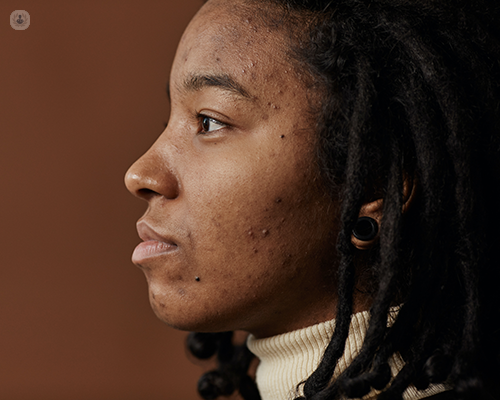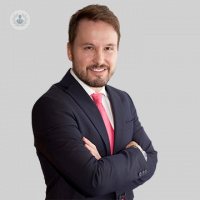Ask an expert: should acne be treated with antibiotics?
Written by:Dermatologists sometimes prescribe antibiotics to kill bacteria and treat severe breakouts caused by acne. Antibiotic use has become increasingly discouraged in recent years, however, due to their severe side effects. Dr Íñigo De Felipe, leading consultant dermatologist, explains where the issue lies and how to address it.

Why is acne treated with antibiotics?
As if acne were an infection, antibiotics have been a widely used resource in the treatment of acne. But antibiotics are not the most ideal solution for the acne process.
There is a basis for their use. Secondary infections produced by the excess production of sebum occur when the sebaceous glands beneath the surface of the skin are obstructed, causing trapped bacteria to proliferate and start to grow. This process then leads to infections, which can be addressed with antibiotics.
Both orally and topically (as creams), dermatologists and doctors have resorted to the use of antibiotics for decades.
What are the side effects of long-term antibiotic use?
Worldwide, around 75 per cent of people with acne are treated with antibiotics, according to estimates. This is not the most ideal solution if we carefully examine the characteristics of antibiotics and the process of acne, even though it might seem like a good solution at first.
For example, once antibiotic treatment has ceased, most acnes that are treated with antibiotics usually come back.
Antibiotics also have numerous side effects, including:
- Antibiotic resistance: rooted (obstructed) in the acne, bacteria that remain learn - faster and better every time - to generate resistance to antibiotics.
- Risk of illnesses: the use of antibiotics increases the predominance and risk of illnesses, including pharyngitis, bronchitis or Crohn’s disease. When people are treated with antibiotics for a long time, they begin to develop other illnesses.
- Effect on flora: good gut flora, which is crucial for the immunisation and protection against several illnesses, is killed by antibiotics.
- Risk of breast cancer: a study in 2010 by the University of Vancouver revealed that the risk of breast cancer increases by 46 per cent with only three months of antibiotic intake. If antibiotics are taken for a year, the risk of breast cancer multiplies by two.
- Risk of colon cancer: antibiotics increase the risk of colon cancer.
Antibiotics can cause many problems in the long-term, even though their use can be a temporary and transitory solution. As dermatologists, we should thus avoid using antibiotics in the treatment of acne.
What is the solution?
To focus on the sebaceous gland, which is the most pressing issue, by reducing its size with laser and reducing its production of sebum with retinoids (vitamin A derivatives).
We have used antibiotics for decades, but they cause more problems than they resolve. I say, let’s forget about them.
Dr Íñigo De Felipe is a leading consultant dermatologist based in London, who specialises in the treatment of skin conditions such as acne and rosacea. If you suffer from acne and would like to seek expert assessment and management, don’t hesitate to visit Dr De Felipe’s Top Doctors profile today.


